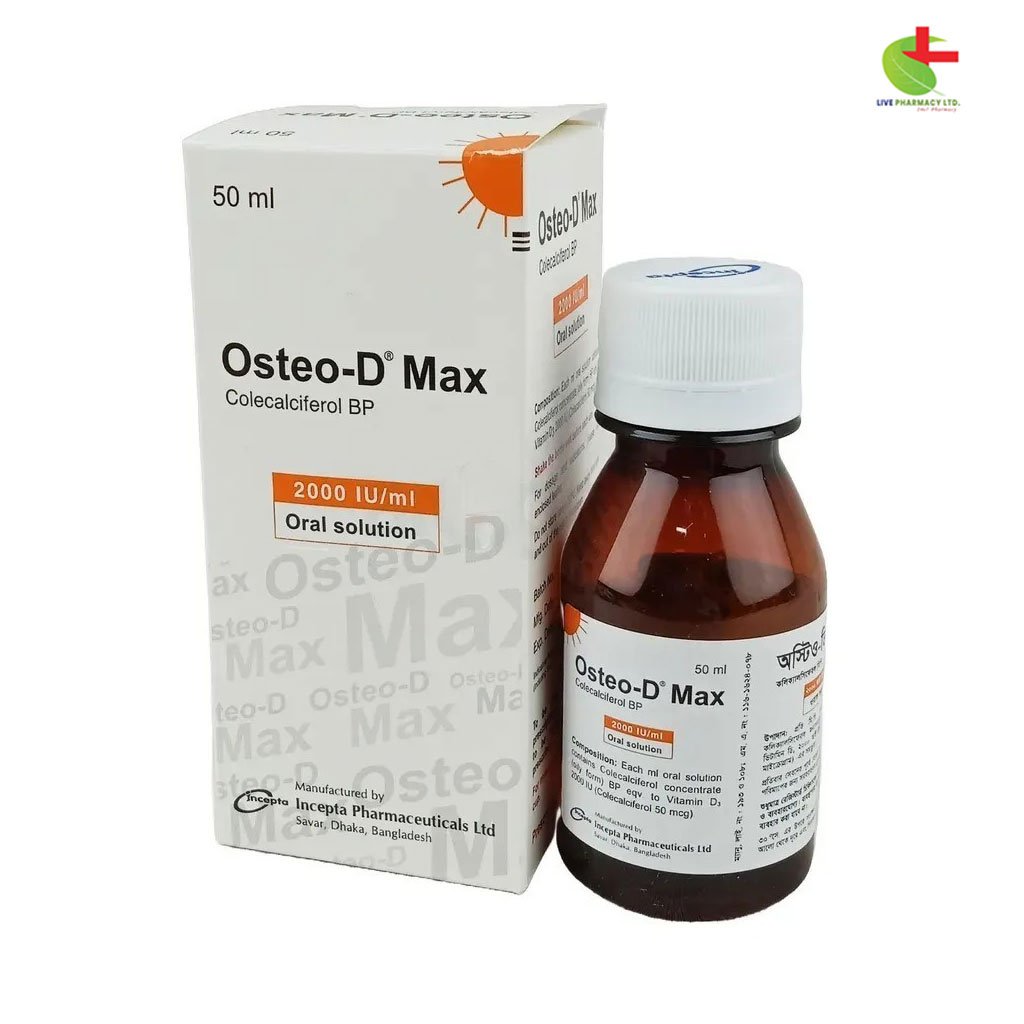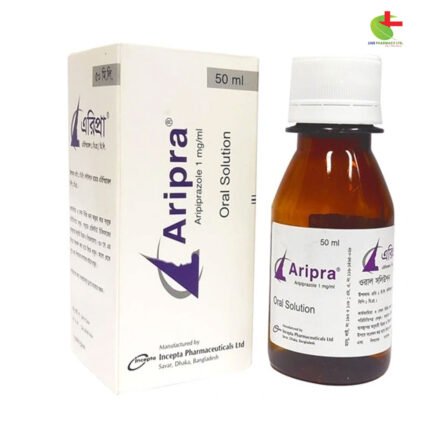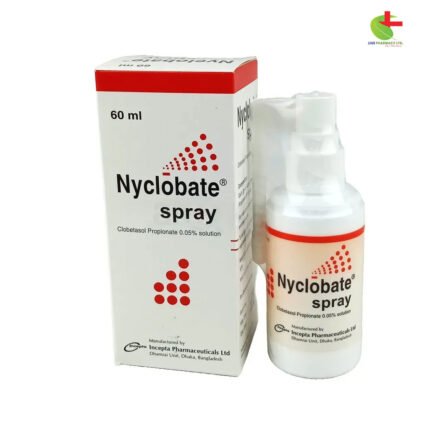Osteo-D Max
150.00৳ Bottle (50ml)
- Vitamin D3 is essential for calcium and phosphate absorption, promoting healthy bones and teeth.
- It helps prevent conditions like rickets, osteomalacia, and osteoporosis, and supports immunity.
- It is vital during pregnancy to prevent pre-eclampsia and support the infant’s growth.
- Available in various forms, including capsules, tablets, syrup, and injections, for different age groups and deficiencies.
 Brand
Brand
|
Incepta Pharmaceuticals Ltd |
|---|---|
 Generics
Generics
|
Cholecalciferol [Vitamin D3] |
 Type
Type
|
Oral Solution |
Indications
Vitamin D3 deficiency can develop in individuals with limited sun exposure or those lacking sufficient dietary intake of this vital nutrient. Vitamin D3 plays a crucial role in enhancing the absorption of calcium and phosphate, which are essential for maintaining strong bones and teeth. Its deficiency can lead to conditions like rickets, osteomalacia, and osteoporosis. Additionally, Vitamin D3 supports the prevention of pre-eclampsia during pregnancy and is essential for breastfeeding mothers, as it is critical for the development of the infant. Furthermore, Vitamin D3 is a key player in boosting immunity.
Consult a registered healthcare provider before using this medication.
Pharmacology
The active form of Vitamin D3, Calcitriol, works by binding to Vitamin D receptors (VDRs), which are found in various body tissues. As a fat-soluble vitamin, Vitamin D3 has a half-life of approximately 50 days. It is absorbed through the small intestine, where it binds to specific a-globulins, and is then transported to the liver for conversion into 25-hydroxy Vitamin D3 (Calcidiol). A further transformation into 1,25-dihydroxy Vitamin D3 (Calcitriol) occurs in the kidneys, facilitating calcium absorption. Non-metabolized Vitamin D3 is stored in fat and muscle tissues. Vitamin D3 is eliminated from the body via feces and urine.
Dosage & Administration
For Capsules
Adults:
- Treatment of Vitamin D3 deficiency: 40,000 IU once weekly for 7 weeks. Maintenance dose: 1,400–2,000 IU/day. To assess the target levels of 25-hydroxyvitamin D, measure it 3–4 months after initiating maintenance therapy.
- Prevention of Vitamin D3 deficiency: 20,000 IU every 4 weeks. Higher doses may be needed in specific cases.
- For osteoporosis treatment: 20,000 IU once a month.
For Capsules (Children 12-18 years):
- Treatment of Vitamin D3 deficiency: 20,000 IU every 2 weeks for 6 weeks.
- Prevention of Vitamin D3 deficiency: 20,000 IU every 6 weeks.
For Film-Coated Tablets
- Adults: 1,000 IU (1-2 tablets) daily or as directed by a healthcare provider. Take with food or within 1 hour after a meal.
For Oroflash or Chewable Tablets
- Adults: 1,000–2,000 IU daily or as directed by a healthcare provider. Chew and swallow the tablet after placing it in your mouth.
For Syrup (Infants and Children)
- At risk of Cholecalciferol deficiency:
- 0-1 year: 400 IU/day (2 ml)
-
1 year: 600 IU/day (3 ml)
- For Vitamin D3 deficient patients:
- 0-1 year: 2,000 IU/day (+50,000 IU/week) for 6 weeks
- 1-18 years: 2,000 IU/day for 6 weeks
Injection
- Prevention:
- Infants on Vitamin D-enriched milk: ½ ampoule (0.5 ml) = 100,000 IU every 6 months.
- Infants not on Vitamin D-enriched milk, or young children up to 5 years: 1 ampoule (1 ml) = 200,000 IU every 6 months.
- Adolescents: 1 ampoule (1 ml) = 200,000 IU every 6 months during winter.
- Pregnancy: ½ ampoule (0.5 ml) = 100,000 IU from the 6th or 7th month.
- Elderly: ½ ampoule (0.5 ml) = 100,000 IU every 3 months.
- Vitamin D deficiency:
- 1 ampoule (1 ml) = 200,000 IU, repeat every 1 to 6 months or as advised by a healthcare provider.
Consult a registered healthcare provider before using this medication.
Interactions
Certain medications may interfere with Vitamin D3 absorption and metabolism, potentially leading to deficiency. These include magnesium-containing antacids, digoxin, thiazide diuretics, cholestyramine, cholestipol, phenytoin, phenobarbital, orlistat, and mineral oil. Corticosteroids like prednisolone can also increase the body’s need for Vitamin D3.
Contraindications
Vitamin D3 should not be used in individuals with hypercalcemia or hypersensitivity to Vitamin D3 or any of its ingredients. It is also contraindicated in patients with evidence of Vitamin D3 toxicity.
Side Effects
Side effects are rare but may include anorexia, nausea, vomiting, constipation, diarrhea, weight loss, polyuria, sweating, headache, dizziness, excessive thirst, and elevated calcium and phosphate levels in blood and urine.
Pregnancy & Lactation
Vitamin D3 is generally considered safe at doses up to 4,000 IU during pregnancy. The recommended daily intake is 400 IU, but higher doses may be necessary for those with a deficiency. Pregnant women should consult their healthcare provider to determine the appropriate dosage based on individual needs.
Vitamin D3 and its metabolites are excreted in breast milk, but no overdose cases in breastfed infants have been reported. When supplementing a breastfed child, consider the dose of Vitamin D3 the mother is receiving.
Precautions & Warnings
Plasma calcium levels should be monitored in patients receiving high doses of Vitamin D3, especially those with renal impairment, during pregnancy and lactation, and in individuals taking digoxin or thiazide diuretics. People with liver or kidney disease, hyperthyroidism, lymphoma, tuberculosis, or granulomatous diseases should consult a healthcare provider before using Vitamin D3 supplements.
Use in Special Populations
The safety and efficacy of Vitamin D3 in children under 12 years have not been established.
Overdose Effects
Overdose may result in hypervitaminosis D, leading to elevated calcium levels in the blood and tissues.
Therapeutic Class
Vitamin for bone health and Vitamin D preparations.
Storage Conditions
Store below 30ºC, away from light and moisture. Keep out of reach of children.













Reviews
There are no reviews yet.